Fathers Who Show Up: Arthur Usher on Redefining Dad Duty
We often talk about the importance of mothers in shaping a child’s life, and rightly so. But today, we’re turning the spotlight on fathers, the quiet heroes whose presence, love, and guidance can make all the difference. A father’s role goes far beyond providing; it’s about showing up with heart, with purpose, and with consistency. This month, we set out to find fathers who are doing just that, men who are not only raising children but raising the bar. And this week, our very own Sabreena Daly sat down with one such dad, Arthur Usher. He’s a dedicated social worker and, more importantly, a devoted father. Here’s what he had to say about what it truly means to be a dad.
 Sabreena Daly, Reporting
Sabreena Daly, Reporting
Meet Arthur Usher, a social worker by day, and more importantly, a hands-on, heart-first dad to his thirteen-year-old son, Arthur Jr. When Arthur first found out he was going to be a dad, he was hit with a wave of emotions. Joy? Absolutely. But also, a fair bit of anxiety. Like many first-time fathers, he remembers that moment vividly, the excitement, the questions, and the quiet pressure to step up and be everything his child would need.
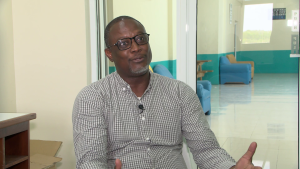
Arthur Usher Sr.
Arthur Usher Sr., Father
“I was scared. It was a frightening thought. For me, I think it was more along the line of the immense responsibility that was ahead. Understanding the responsibility now to literally mold a human being; even now it feels like a mind trip sometimes. Because I was like what do I do? What if I mess up?”
There’s no manual for parenting. No step-by-step guide that fits every child. Instead, parents often develop their own rhythm, shaped by experience, instinct, and love. For Arthur Usher, good parenting starts with seeing your child for who they really are, not who you thought they’d be. It’s about tuning in, letting go of expectations, and letting your child’s unique personality shape the way you show up as a parent.
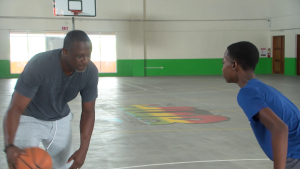 Arthur Usher Sr.
Arthur Usher Sr.
“For me, it’s about understanding who he is at his core and bringing that out. I’m not trying to force him in any one direction. My approach has always been to guide him through life, and I try to do that in the best way I can.”
Ask any child what matters most, and chances are, it’s not perfection, it’s presence. For thirteen-year-old Arthur Jr., the value of his father’s love isn’t found in grand gestures, but in the everyday moments they share. He had no trouble pointing out the ones he holds closest to his heart.
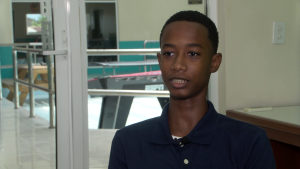
Arthur Usher Jr.
Arthur Usher Jr., Son
“My dad’s a hardworking person and he always makes time to play video games and teach me how to play basketball better and a bunch of other stuff. When he’s free, even when he has a lot of work to do and people are calling him a lot, he still makes time for me and the family.”
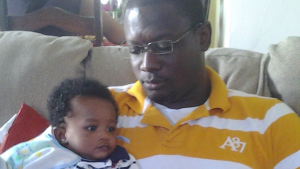 He has seen it too many times. As a social worker, Arthur’s on the front lines, witnessing the impact that growing up without a father can have on a child. It’s personal for him, not just professional. “The numbers don’t lie,” he says. “They tell a story we can’t afford to ignore.” For him, the absence of a father figure isn’t just a statistic, it’s a driving force behind many of the struggles today’s youth are facing. And it’s why he’s so committed to being present, not just for his own son, but as a voice for change in the wider community.
He has seen it too many times. As a social worker, Arthur’s on the front lines, witnessing the impact that growing up without a father can have on a child. It’s personal for him, not just professional. “The numbers don’t lie,” he says. “They tell a story we can’t afford to ignore.” For him, the absence of a father figure isn’t just a statistic, it’s a driving force behind many of the struggles today’s youth are facing. And it’s why he’s so committed to being present, not just for his own son, but as a voice for change in the wider community.
 Arthur Usher Sr.
Arthur Usher Sr.
“I think a lot of our social issues we’re seeing in Belize right now are because of a lack of fatherhood and that level of mentorship. Fathers and mothers lead and guide in different ways, so the child does need both—however they can get both—because we tend to put a lot of strain on nuclear systems and nuclear families, but it doesn’t necessarily have to be that way. Looking at my profession and the work that I do, you can see what the lack of fatherhood promotes. Sometimes we want to deny these things and say it’s not because of that, but the data is there. You can see that in a household with a consistent father, the children are a bit different from those without.”
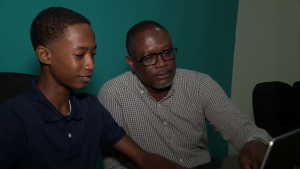 Arthur Usher Jr.
Arthur Usher Jr.
“My dad loves the work that he does, and he shares that with me as well. Just the other day, we saw one of the kids he teaches—he’s working now—and he said that’s the kind of work he does. He’s proud of that kid because he was with him a couple of years ago, and now he’s working.”
The presence of a father in the home helps shape a child’s sense of stability, identity, and emotional well-being. Arthur Usher Sr. understands this not just through his work, but through the daily responsibility of raising his own son. For him, fatherhood isn’t just about showing up, it’s about showing up with purpose.
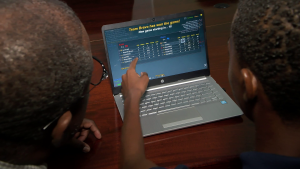 Arthur Usher Sr.
Arthur Usher Sr.
“I want to be present. For me, the main thing is trying to be present and active, and also trying to be open. I think that’s one of the main things I’ve learned over the years, especially in this field—you truly have to listen.”
 Arthur Usher Jr.
Arthur Usher Jr.
“I don’t know how, but sometimes when I need help with work or something, I tell my dad, and he tells me how to relate to it and how he related to it. Like, I’ll tell him about my friends, and he’ll tell me what his friends did and how he managed it.”
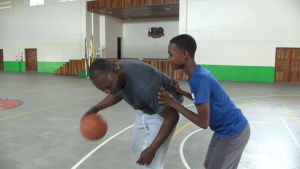 As parents, hoping you’re doing it right is often a good sign you’re on the right track. Some say a true indicator is how your children show up—in their confidence and the way they express themselves. We asked Arthur Jr. what inspires him about his dad and, well… his response might be an indicator that he’s doing alright.
As parents, hoping you’re doing it right is often a good sign you’re on the right track. Some say a true indicator is how your children show up—in their confidence and the way they express themselves. We asked Arthur Jr. what inspires him about his dad and, well… his response might be an indicator that he’s doing alright.
Arthur Usher Jr.
“He inspired me to push myself beyond my limits. When I play basketball, he always tells me to be aggressive and do what others aren’t doing. I always try to remember that.”
Looking on the Bright Side, I’m Sabreena Daly.






Facebook Comments